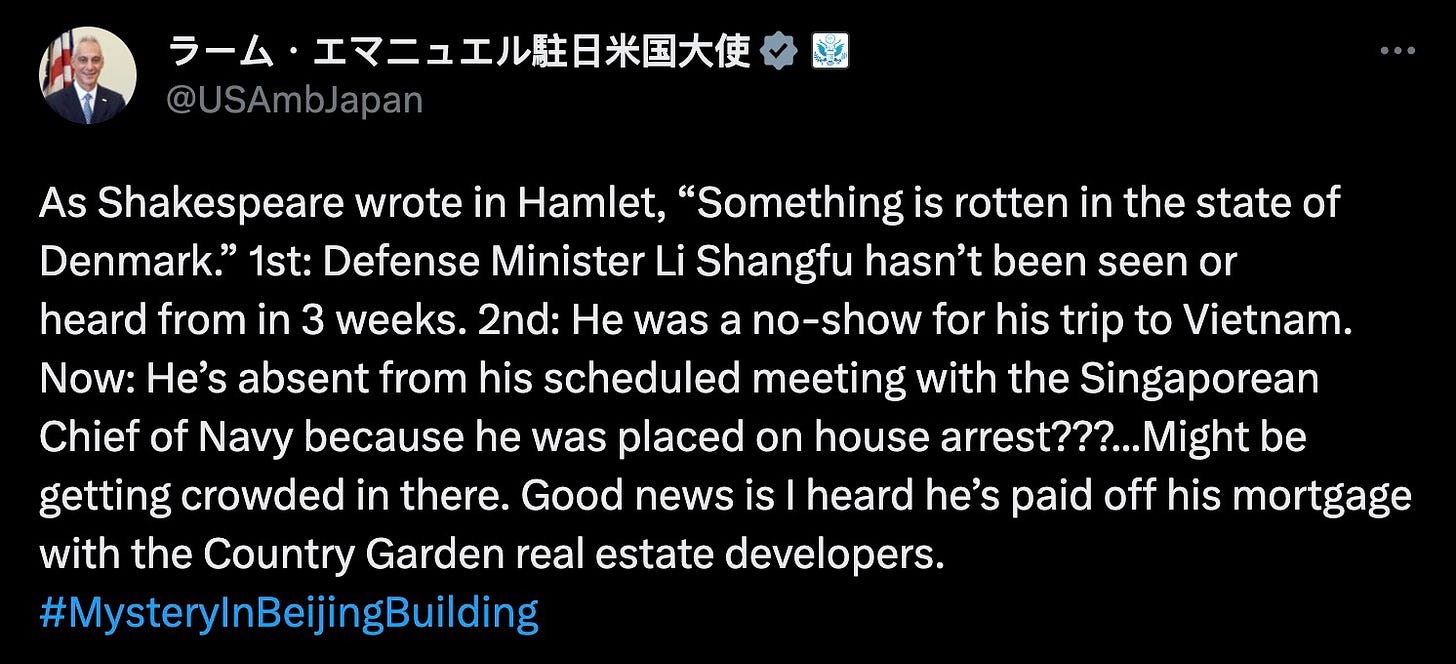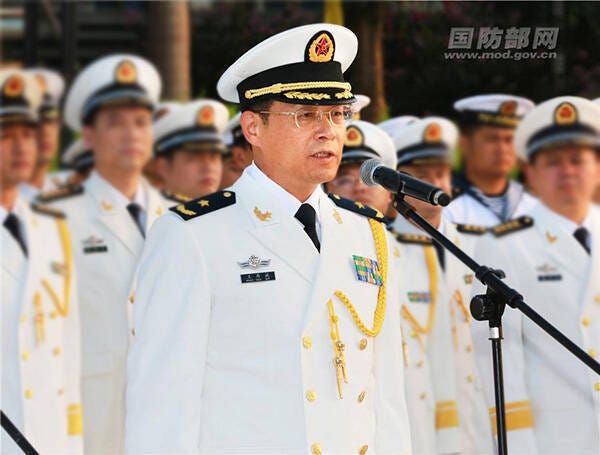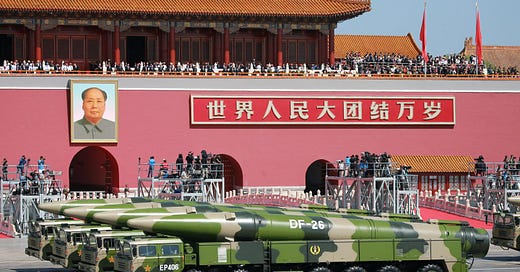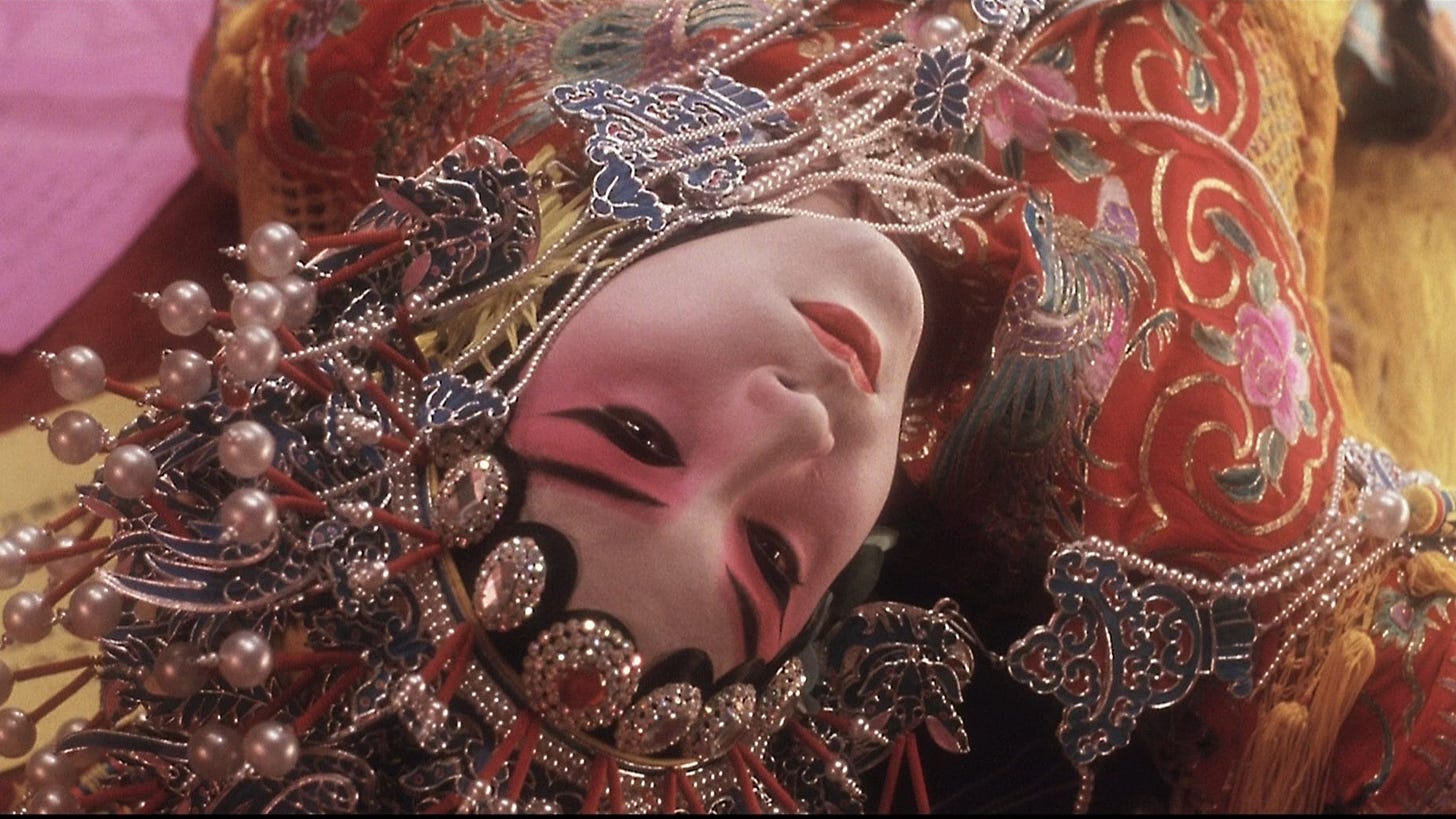Purges! The Curious Case of the Disappearing Commanders
How Xi’s second corruption crackdown spells long term trouble for China's military
Elite Chinese politics, declares Frederick Teiwes, is a “black box, largely opaque not only to outsiders but also even highly positioned members of the elite itself.” Try as we might, Teiwes believes, we’ll inevitably get it wrong. “The dominant contemporary Western scholarly assessments of Chinese Communist Party (CCP) elite politics in almost every period of the history of the People’s Republic of China (PRC) have been either dramatically wrong, a very mixed bag, or in critical respects speculation that cannot be verified on existing evidence”:
In any political system much of what goes on regarding major developments is partially obscure, but in authoritarian Leninist systems impediments to understanding are much more systematic, making the concept of a “black box” more than appropriate. Norms of Party discipline are strong, restrictions on the right to know and have a voice are extensive even if varying over time, and mistrust among leaders can inhibit communication and create misperceptions. Moreover, the ability of the regime to create an official narrative that distorts reality has not only misled foreign scholars, but also affected the ongoing dynamic of Party politics itself.
That said, when defense ministers start disappearing, here at ChinaTalk we, just like US Ambassador to Japan Rahm Emanuel, can’t help ourselves!

In the spirit of making a serious attempt to figure out what the hell is going on, today we’re running a guest column from Matt Bruzzese, senior analyst for BluePath Labs, who takes us through the dramatic house-cleaning of China’s Rocket Force and what it tells us about Chinese military readiness.
Around late June of this year, rumors emerged that PLA Rocket Force (PLARF) commander Li Yuchao 李玉超 and several of his deputies were under investigation. While it was true that General Li had not been seen in public for some time, at the time they remained just that — rumors, largely from some of the more lurid fringes of the Taiwanese and anti-CCP China-watcher space. The more extreme versions this time around suggested that Li’s downfall was the result of a son in America who had been sharing classified information, including, in some versions of the story, with the author of this article. Such rumors are not uncommon, and are best taken with a pinch to a shaker of salt, depending on their absurdity. In 2021, similar rumors that a senior intelligence official named Dong Jingwei 董经纬 had defected reached a crescendo in Western media before Mr. Dong reappeared in Chinese media, still very much at his post, still very much in China.
The Usual Summer Cleaning?
By the end of July, the increasing smoke swirling around the story became harder to ignore. First, video emerged of a PLA Party building meeting in which senior PLARF officers seemed to be conspicuously absent. While (presumably more junior) PLARF officers are visible in the background, none of them appear alongside the senior-most officers in the front row as they deliver their reports. Then, evidence emerged that PLARF Deputy Commander Wu Guohua 吴国华, whom the rumor mill claimed had committed suicide following his dismissal, had indeed passed away in recent days under unexplained circumstances. On July 28, the South China Morning Post reported that Li and at least two PLARF deputy commanders were under investigation. On July 31, the Chinese government officially confirmed that both Li Yuchao and PLARF Political Commissar Xu Zhongbo 徐忠波 (who had not even been a part of the purge rumors to this point) had been replaced.
Conspicuously, both were replaced by senior officers from the Air Force and Navy rather than by PLARF officers, seemingly confirming that this was an effort to clean house.
This time, the rumors had proved to be true (at least some of them — the claim that Li’s son divulged information remains completely uncorroborated, and the claim that he spoke with the author of this article is, the author can confirm, complete nonsense). The question now is: why did the purge happen? And what does it all mean — for the PLARF, for the PLA, and for Xi?
The purge of senior PLA officers is far from unprecedented. Indeed, it has become almost commonplace in the last decade, as Xi has made tackling pervasive military corruption a key part of his wider anti-corruption campaign. Nor were Commander Li and Political Commissar Xu the senior-most officers to go down in this decade-long campaign. That dubious honor goes to Guo Boxiong 郭伯雄 and Xu Caihou 徐才厚, whose positions as Vice Chairmen of the Central Military Commission placed them below only Xi himself in the PLA hierarchy. Nor is it unprecedented to occasionally replace a senior officer with someone outside the service. In fact, Xu Zhongbo himself spent most of his career in the PLA Army before being promoted to PLARF Political Commissar.
This Time is Different
What is unprecedented, however, is the sudden decapitation of an entire military service, followed by its complete replacement by outsiders, as has just happened to the PLARF. Whatever problems existed in its upper echelons must have been extreme to warrant such steps, which are likely to have significant short-term effects on readiness and force building at a time when the PLARF is rapidly growing and modernizing. While the rumor mill initially suggested espionage, all signs now point to corruption, as reported in the initial South China Morning Post story. If corruption is the motive for the purge, the PLARF of recent years likely offers a bonanza of potential misconduct to choose from. It has grown at eye-watering speed since its upgrade to a full service in 2016, adding at least eleven brigades, along with an array of advanced new weapons and technology. Most significantly, around 2021, the PLARF began a massive expansion of its nuclear silo system, ballooning from fewer than twenty silos to over 300.
Such expansion means a lot of money suddenly sloshing around, and it wouldn’t be surprising if some of that money found its way into the pockets of the PLARF leadership’s friends. Graft in contracting and acquisitions has historically been a key avenue of corruption for the PLA. Gu Junshan 谷俊山, the former Deputy Director of the PLA General Logistics Department, was alleged to have channeled contracts to his brother’s businesses before falling to Xi’s anti-corruption drive in 2014. Further evidence of the corruption being related to PLARF contracting comes from the fact that Liu Guangbin 刘光斌, one of the PLARF Deputy Commanders alleged to be under investigation, served as the PLARF’s Equipment Department Director as late as 2019, likely giving him ample opportunity to influence contracts and dip into the PLARF’s piggybank.
Whatever the reasons for the purge, Xi must have felt that the rot ran deep and required drastic measures, even if this came at a short-term expense. Notably, both the new Commander, Wang Houbin 王厚斌, and PC, Xu Xisheng 徐西盛, come not from the PLARF ranks but from the Navy and Air Force, respectively. Such a counterintuitive move strongly suggests that Xi felt he could not trust the current crop of PLARF deputies to step up into the role. This selection of two outside babysitters due to a lack of trust from leadership is likely to have a negative impact on morale.
More importantly, however, neither Wang nor Xu appears to have any meaningful experience with the nuclear or conventional missiles which are the PLARF’s raison d’être.
While there is no reason to believe Wang and Xu aren’t capable leaders — and indeed, in the long-term their selection may help the PLARF better integrate into the PLA’s joint system — there is likely to be a steep learning curve, especially if many of the deputies they would have otherwise relied on have also been purged. The simultaneous selection of two inexperienced leaders, advised by a coterie of deputies who may be wondering whether they will soon be arrested, is likely to have negative short-term effects on readiness and force-building. Coming at the very time when the PLARF is supposed to be growing into its role as a full service, it may force the PLARF to slow some of its ambitious plans.
These events are also likely to have negative short-term effects on the PLA as a whole. The PLARF’s ability to rain huge numbers of conventional missiles onto Taiwan and other strategic targets in the region — including US carrier groups, airbases, and logistical hubs as far out as Guam — is a key part of the PLA’s strategy of anti-access/area denial (A2/AD). A Rocket Force in turmoil at the top does not bode well for the PLA’s ability to achieve its goals in Taiwan in the short term.

What’s Corruption When It’s at Home?
The recent purge also pulls back the curtain a bit on the state of Xi’s anti-corruption efforts. While some observers have suggested that Xi’s anti-corruption campaign has had more to do with removing potentially disloyal officers and replacing them with his own people, by now it is obvious that Xi is actually serious about rooting out military corruption. After all, Li and Xu were selected under Xi’s watch and are presumably his people — but that wasn’t enough to save them.
Serious or not, it can’t be a good sign that a decade after Xi began his anti-corruption push, it is still popping up in the highest echelons of power — most recently, in the apparent purge of Defense Minister Li Shangfu 李尚福, who disappeared in August, only a few months after being appointed. (As with his PLARF counterpart Liu Guangbin, Li also served in a position overseeing PLA equipment development and procurement, suggesting his purge may be related to the same brand of graft.)
In recent years, Xi has struck a triumphalist tone on his battle with military corruption. In his 2017 speech to the 19th Party Congress, Xi declared that the Party and military’s “excellent work style” had been restored, and that the PLA was now effectively governed. Likewise, the PLA’s 2019 White Paper declared “overwhelming victory” against corruption. Under these conditions, it appeared that Xi’s anti-corruption campaign against the PLA was, if not winding down, at least shifting into a lower gear. [Ed: maybe this was a sign to get back in business!] Recent events suggest, however, that while the most blatant signs of corruption may have improved since 2012 (when the going rates to purchase a promotion were basically an open secret), the root causes of corruption may not have been stamped out so much as forced underground, just waiting to emerge again when the heat inevitably died down. It goes without saying that, coming on the heels of his numerous statements about having corruption under control, this is not a good look for Xi or his campaign.
Up to now, life was good for the PLARF. It came out as the biggest winner in the PLA’s latest round of reforms, snagging an upgrade to a full-service co-equal with its army, navy, and air force counterparts, and receiving an injection of funding which allowed it to rapidly expand in size and capabilities. It clearly enjoyed a favorable position with Xi as it beefed up its nuclear force, placing it at the vanguard of Xi’s mission to turn China into a globally respected power.
But as rapid as its rise has been, the PLARF’s fall from grace has been even faster. While it remains to be seen exactly how it will be affected, these events are likely to slow the PLARF’s more ambitious plans in the near term. Apparently, Xi saw these short-term pains as a worthwhile tradeoff to root out whatever good-ole-boy network existed in its upper ranks. This decision may prove to be correct if it leads to a more effective force in the long term. Until then, however, the purge of the PLARF suggests that the PLA’s greatest enemy continues to be, well, itself.
Tuesday October 3 New York Movie Screening of Farewell My Concubine 霸王别姬
I’ll be going to the 7:30 p.m. screening at Film Forum of the greatest twentieth-century Chinese movie. Tickets here — reach out if you can come, and I’ll get some folks together for a meal beforehand.





It's interesting that this is a notable moment in which systematic corruption cannot be blamed on Xi's predecessors. Even if he is cleaning house, Xi is the one who made a mess in the first place.